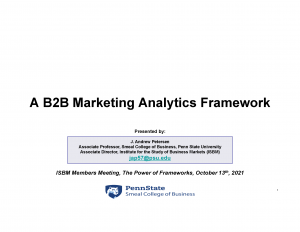
B2B commercial analytics: What outperformers do
B2B firms that outperform their peers in predictive analytics share four key characteristics.
ISBM at the Penn State Smeal College of Business – Academic Institute supporting B2B Research. Switch to the ISBM-Corporate website.

B2B firms that outperform their peers in predictive analytics share four key characteristics.

Trends in B2B markets indicate that the COVID-19-related growth in e-commerce will continue for years to come.

Data-driven marketing decisions (including choices of which data analytics techniques to use and how) should be based on and address the following First Principles of Marketing, as foundational assumptions: (1) All customers differ; (2) All customer change; (3) All competitors react; (4) All resources are limited. The First Principles Framework for marketing analytics provides a way to align each of the four First Principles with a set of approaches, processes, and analysis tools that can deal with the unique issues associated with each principle. This will help firms with developing plans, budgets, and metrics as well as creating a sustainable competitive advantage into the future. Presentation from the October 2021 ISBM Members Meeting.

The voice of the customer is a powerful tool for firms that are equipped to both listen to it and put its insights into action.

New developments in consumer tracking online will require innovative approaches from B2B marketers.

Data wrapping is the practice of giving data and analytics to customers as product features and customer experiences, with the goal of increasing a product’s value proposition. The users of these data wrapping functionalities are the company’s customers – not the employees. And as this is a customer oriented feature being a part of the product offering, the product road map is lead by product owners – not IT. It is an interesting strategy to monetize data – in a way that extends the product value proposition.

The CMO Survey is a tool to collect and disseminate the opinions of top marketers on a variety of topics. This Special Edition, published in June, focuses on understanding the impact of the Covid-19 pandemic on marketing in companies, including marketing spending, performance, jobs, and expectations for the next year. The added value of the CMO Survey is the longitudinal nature of the research, which allows tracking of opinions, evaluations, and expectations over time. Especially facing a pandemic, the ‘breaks’ in the trends are notable.

Effective marketing decision making often requires both qualitative and quantitative analysis. Many marketing analyses across the 4Ps can be supported by quantitative analyses, for example market size estimation, determining economic value to customers, demand generation and customer acquisition with the help of customer lifetime value analysis, channel economics, product cannibalization, market share analysis, and pricing. In this technical Harvard Business School note, Sunil Gupta summarizes how these core metrics are calculated and applied.

The AIM Institute studied 50 new product development teams from 20 B2B companies that had conducted B2B customer interviews. Five in six teams reported that these customer interviews impacted their product design. This means that if you don’t interview B2B customers to formulate new product objectives, your customer insight is probably lacking. Most new product development teams would develop substantially different products if they truly understood their B2B customer needs. In the report ‘Guessing at B2B Customer Needs’, the AIMS Institute discussed the method of interviewing customers.

In the age of COVID-19, should companies still engage in market research? Should companies – perhaps better put, how can companies do market research? Could the current crisis even benefit companies that want to field the voice of the customer? Gerry Katz – Vice Chairman of Applied Marketing Science – is an expert of the topic of VOC (Voice of the Customer). He weighs in on how the COVID-19 crisis affects market research.
© 2024 ISBM – Institute for the Study of Business Markets

484 Business Building
University Park, PA 16802
Phone: 814-863-2782
Fax: 814-863-0413
Email: ISBM@psu.edu
© 2020 ISBM – Institute for the Study of Business Markets